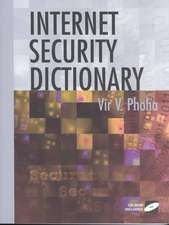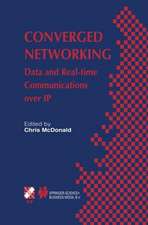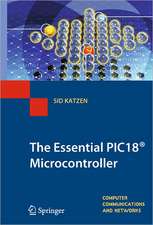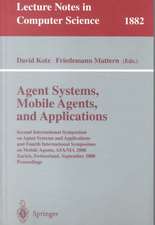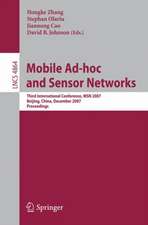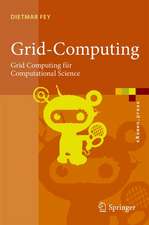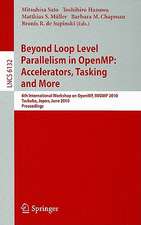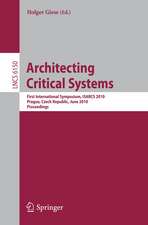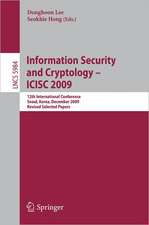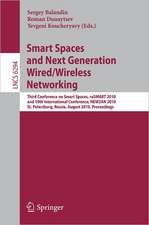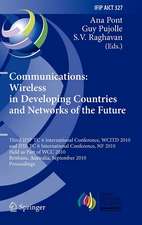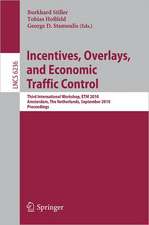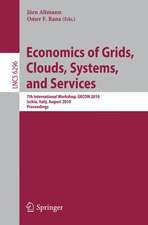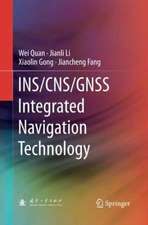Smart Collaborative Identifier Network: A Promising Design for Future Internet
Autor Hongke Zhang, Wei Su, Wei Quanen Limba Engleză Hardback – 12 oct 2016
| Toate formatele și edițiile | Preț | Express |
|---|---|---|
| Paperback (1) | 648.26 lei 6-8 săpt. | |
| Springer Berlin, Heidelberg – 16 iun 2018 | 648.26 lei 6-8 săpt. | |
| Hardback (1) | 654.55 lei 6-8 săpt. | |
| Springer Berlin, Heidelberg – 12 oct 2016 | 654.55 lei 6-8 săpt. |
Preț: 654.55 lei
Preț vechi: 818.18 lei
-20% Nou
Puncte Express: 982
Preț estimativ în valută:
125.24€ • 131.12$ • 103.63£
125.24€ • 131.12$ • 103.63£
Carte tipărită la comandă
Livrare economică 05-19 aprilie
Preluare comenzi: 021 569.72.76
Specificații
ISBN-13: 9783662491416
ISBN-10: 3662491419
Pagini: 300
Ilustrații: XXXI, 318 p. 187 illus., 21 illus. in color.
Dimensiuni: 155 x 235 x 21 mm
Greutate: 0.67 kg
Ediția:1st ed. 2016
Editura: Springer Berlin, Heidelberg
Colecția Springer
Locul publicării:Berlin, Heidelberg, Germany
ISBN-10: 3662491419
Pagini: 300
Ilustrații: XXXI, 318 p. 187 illus., 21 illus. in color.
Dimensiuni: 155 x 235 x 21 mm
Greutate: 0.67 kg
Ediția:1st ed. 2016
Editura: Springer Berlin, Heidelberg
Colecția Springer
Locul publicării:Berlin, Heidelberg, Germany
Public țintă
ResearchCuprins
1. Introduction.- 2. Foundations of Smart Identifier Network.- 3. Principle of Network Component Layer.- 4. Principle of the Pervasive Service Layer.- 5. Evolutions of SINET.- 6. Analysis and Evaluation of SINET.- 7. Scalable Routing Technologies of SINET.- 8. Efficient Mapping System for SINET.- 9. Mobility Management in SINET.- 10. Security Technologies of SINET.- 11. System Development of SINET.- 12. Transition Schemes to SINET.- 13. Applications of SINET.
Notă biografică
Prof. Hongke Zhang received his M.S. and Ph.D. degrees from the University of Electronic Science and Technology of China (UESTC) in 1988 and 1992 respectively. He is currently a professor at the School of Electronic and Information Engineering, Beijing Jiaotong University (BJTU) and director of a National Engineering Lab on Next Generation Internet in China. His research has resulted in many papers, books, patents, systems and equipment in the areas of communications and computer networks. He is the Chief Scientist of a National Basic Research Program of China (973 Program) and has also served on the editorial board of several international journals.
Prof. Wei Su received his Ph.D. degree in Communication and Information Systems from Beijing Jiaotong University (BJTU) in 2008. He is currently a professor at the School of Electronics and Information Engineering, BJTU, where his work focuses on the theories and technologies of the next generation Internet.He has published more than 50 papers, and has taken part in many national projects such as the National Basic Research Program (“973 Program”) and initiatives of the State High Technology Research and National Natural Science Foundation of China (NSFC).
Dr. Wei Quan received his Ph.D. degree in Communication and Information Systems from Beijing University of Posts and Telecommunications (BUPT) in October 2014. He is currently an instructor at the School of Electronics and Information Engineering, Beijing Jiaotong University. His research interests include next generation Internet technologies, vehicular networks, Internet of Things (IoT), future Internet architectures and Internet of Energy (IoE). He has published more than 20 research papers in international journals and conferences, and also serves as a technical reviewer for several journals.
Prof. Wei Su received his Ph.D. degree in Communication and Information Systems from Beijing Jiaotong University (BJTU) in 2008. He is currently a professor at the School of Electronics and Information Engineering, BJTU, where his work focuses on the theories and technologies of the next generation Internet.He has published more than 50 papers, and has taken part in many national projects such as the National Basic Research Program (“973 Program”) and initiatives of the State High Technology Research and National Natural Science Foundation of China (NSFC).
Dr. Wei Quan received his Ph.D. degree in Communication and Information Systems from Beijing University of Posts and Telecommunications (BUPT) in October 2014. He is currently an instructor at the School of Electronics and Information Engineering, Beijing Jiaotong University. His research interests include next generation Internet technologies, vehicular networks, Internet of Things (IoT), future Internet architectures and Internet of Energy (IoE). He has published more than 20 research papers in international journals and conferences, and also serves as a technical reviewer for several journals.
Textul de pe ultima copertă
This book introduces a promising design for future Internet, the Smart Collaborative Identifier NETwork (SINET). By examining cutting-edge research from around the world, it is the first book to provide a comprehensive survey of SINET, including its basic theories and principles, a broad range of architectures, protocols, standards, and future research directions. For further investigation, the book also provides readers an experimental analysis of SINET to promote further, independent research. The second part of the book presents in detail key technologies in SINET such as scalable routing, efficient mapping systems, mobility management and security issues. In turn, the last part presents various implementations of SINET, assessing its merits. The authors believe SINET will greatly benefit researchers involved in designing future Internet thanks to its high degree of flexibility, security, manageability, mobility support and efficient resource utilization.
Caracteristici
Broadens readers’ understanding of the future and current Internet design with clearly presented contents, theories and the state-of-the-art technologies. Provides a promising design for future Internet: the Smart Collaborative Identifier Network. Presents a comprehensive survey of the research frontiers of future Internet. Examines various current problems and solutions in future Internet design. Shares many tips, helpful demonstrations and insights on how to design and maintain communication networks. Includes supplementary material: sn.pub/extras

